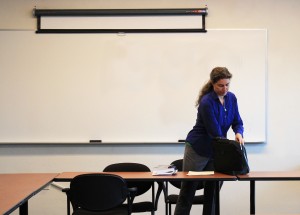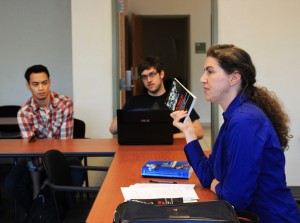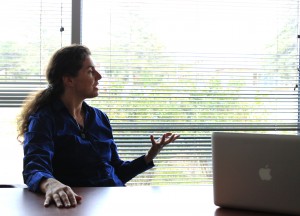Tags
Related Posts
Share This
Radical 101

In her class, Lisa Adler guides students into discussions in order to break down the 1960’s teacher/student hierarchy. Photo by Sandra Shoenenstein
The National Atomic Testing Museum sits on East Flamingo Road in Las Vegas, NV. From there one can travel 65 miles northwest by charter bus to the Nevada National Security Site and take a general interest tour sponsored by the Energy Department. However, before the NNSS became a respite from casino floors and buffet lines, it was known as the Nevada Test Site, and was a destination for contention—particularly between anti-nuclear protest groups and Department officials.
In 1988, on this very site, Lisa Adler was arrested, jailed and charged with a misdemeanor for trespassing on government property. Though a misdemeanor, at a federal level this charge carries a potential penalty of up to one year in jail. Adler managed 24 hours and community service.
Today, in Santa Fe, Adler teaches political theory for the liberal arts department at Santa Fe University of Art and Design. Since 2002, when SFUAD was still the College of Santa Fe, Adler has covered a wide range of subjects including global politics, feminist theory and, currently, social movements for civil rights.
Adler’s arrest in Nevada wasn’t her only confrontation with the Establishment. Her career in political agitation spans almost the entirety of the 1980s and was centered on women’s equality. In college, Adler founded her own women’s rights organization called POWER—People’s Organization for Women’s Equal Rights.
“We just really liked the acronym,” Adler says. POWER advocated for reproductive rights, and participated in many events such as the famous Take Back the Night marches. “Women are denied a sense of safety,” Adler says, and these marches were designed to raise public awareness of sexual assault and rape, according to the organization’s website. Created by European women’s groups in the 1960s, TBTN marches made their way to the U.S. by the 70s, and are still being held today. Traditionally, these events take place on a global scale every third Friday in September. Though the SFUAD Feminist Collective does not plan to host one this month, they do plan to host an event in the Spring 2015 semester, according to a member.

Lisa Adler says about the material used in class “It doesn’t how many times I come across this material, I’m still pissed off.” Photo by Sandra Schoenenstein
“When I was active, we were pretty radical,” Adler says. But despite the agitations and arrests, “One of the most radical things I’ve done as a feminist is name my daughters [Adler].” This, she says, was a symbolic gesture, a way to take ownership of her family.
Though her father was never able to come to terms with this decision, Adler has never regretted it asking, “Why shouldn’t they have their mother’s name?”
When she was a child, Adler had her first experience of being treated differently because of gender. Her grandmother expected Adler to bear the burden of household chores while her brother was often relieved of domestic duty. “It felt like an injustice,” Adler says.
Adler’s mother had a different set of expectations.
“My mother had always been pretty even-handed.” Having been removed from school as a young woman to work in the family business, Adler’s mother wanted to provide other opportunities for her daughter.
Today, Adler holds a doctorate in political science from Rutgers University, a master’s degree in political science from Syracuse University and a bachelor’s degree in Russian studies from University of California Santa Cruz. Her passion for women’s equality remains sturdy. Speaking about the material she uses to instruct, Adler says, “It doesn’t matter how many times I come across this material, I’m still pissed off.”
In class, Adler cultivates an open discourse in which she guides student discussion within the parameters of the assigned reading, rather than lecturing. This, she says, is designed to break down the 1960s hierarchy between teacher and student.

Lisa Adler talks about her confrontations with the establishment and how she founded her own women’s rights organization. Photo by Sandra Schoenenstein
“She knows how to begin and hold a discussion that keeps the students attention…it’s intimidating to speak, but Adler makes the material clear and easy to understand,” says student Sara Perez. As a result, students practice articulating their opinions, and develop their own ideas about feminism to apply to their experience.
“Feminism is a continuum,” Adler says, and though she thinks the movement has made large strides over the decades, she says there is still much more work to be done on many levels. Nationally, “we have the resources, but we don’t have the priorities,” Adler says, adding, “what if all the resources of Homeland Security were directed towards domestic violence?”
On a smaller scale, it starts with the family. “Teach your children to respect themselves, and respect others.” And for the parents who may fret that their daughters play with trucks, or their sons play with dolls, “They’re fine,” she says, “the world is open to interpretation.”






 Jackalope Magazine is the student magazine of Santa Fe University of Art and Design. Building on the interdisciplinary nature of our education, we aim to showcase the talent of our university and character of our city.
Jackalope Magazine is the student magazine of Santa Fe University of Art and Design. Building on the interdisciplinary nature of our education, we aim to showcase the talent of our university and character of our city.
Recent Comments